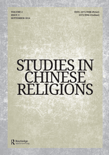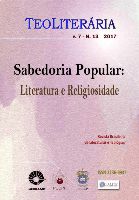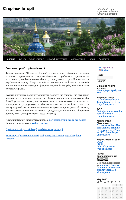
Konstantinove Listy-Constantines Letters
Scope & Guideline
Illuminating historical and philosophical insights for a modern audience.
Introduction
Aims and Scopes
- Cyrillo-Methodian Studies:
The journal emphasizes the study of the Cyrillo-Methodian tradition, exploring its impact on Slavic cultures, literature, and religious practices. - Byzantine and Slavic Relations:
Research on the historical interactions between Byzantine and Slavic communities, including linguistic, cultural, and religious exchanges is a central focus. - Ecclesiastical History:
The journal publishes works on the history of churches in Eastern Europe, including the development of ecclesiastical structures and the role of key historical figures. - Cultural Heritage and Literature:
There is a strong emphasis on the preservation and analysis of cultural heritage, particularly through literature, historical texts, and artistic representations. - Philosophical and Theological Inquiry:
The journal engages with philosophical and theological discussions, particularly those related to Christian thought and its evolution throughout history. - Historical Linguistics and Translation Studies:
Research on historical linguistics, particularly in relation to the Slavic languages, and studies on the translation of religious texts are also key themes.
Trending and Emerging
- Interdisciplinary Approaches to Historical Research:
There is an increasing trend towards interdisciplinary studies that combine history, philosophy, literature, and cultural studies, reflecting a more holistic view of Slavic heritage. - Focus on Women in Historical Contexts:
Recent papers have increasingly addressed the roles and contributions of women in historical narratives, particularly within ecclesiastical contexts, highlighting a growing interest in gender studies. - Cultural Memory and Identity Formation:
Themes surrounding cultural memory and the formation of identity in post-socialist societies are gaining traction, reflecting contemporary socio-political dynamics. - Digital Humanities and Scholarly Communication:
Utilization of digital tools and methodologies for the analysis and dissemination of historical texts and cultural artifacts is emerging, indicating a shift towards modern research practices. - Revival of Folk Traditions and Practices:
Research into the revival and reinterpretation of folk traditions within modern Slavic cultures is on the rise, indicating a renewed interest in cultural roots and identity.
Declining or Waning
- Modern Political Contexts of Religious Traditions:
Studies that directly relate the historical figures or traditions to contemporary political contexts and debates seem to have less frequency, suggesting a waning interest in this approach. - Regional Studies Outside Central and Eastern Europe:
There appears to be a decline in research focusing on Slavic traditions and influences outside the Central and Eastern European context, indicating a narrowing of geographical focus. - Secularization of Religious Practices:
Investigations into the secularization of religious practices within Slavic societies have become less prevalent, possibly due to a shift towards more traditional theological studies. - Comparative Studies with Western Christianity:
Comparative analyses between Slavic and Western Christian traditions have seen a reduction, suggesting a move towards more insular studies that focus on Slavic traditions themselves.
Similar Journals

INDO-IRANIAN JOURNAL
Illuminating the Path of Linguistic and Philosophical InquiryINDO-IRANIAN JOURNAL, published by BRILL, serves as a premier platform for scholarly research within the fields of linguistics, philosophy, and political science. Established in 1957 and continuing through 2024, this journal is unwavering in its commitment to advancing the understanding of Indo-Iranian studies by incorporating a rich diversity of perspectives and methodologies. With an ISSN of 0019-7246 and an E-ISSN of 1572-8536, it is indexed in Scopus and has garnered respectable rankings, including a Q3 classification in both Linguistics and Language and Philosophy for 2023, indicating its significance in the academic community. Although it does not offer open access, the journal prioritizes the dissemination of high-quality research, contributing to the ongoing discourse in these vital areas of study. By fostering a rigorous academic exchange, the INDO-IRANIAN JOURNAL is essential for researchers, professionals, and students dedicated to exploring the intricacies of Indo-Iranian interactions and their broader implications.

STUDIES IN EAST EUROPEAN THOUGHT
Connecting Diverse Methodologies to Eastern European ThoughtSTUDIES IN EAST EUROPEAN THOUGHT is a premier academic journal published by Springer, focusing on the multifaceted intellectual heritage and cultural dynamics of Eastern Europe. Established in 1993, this journal has been a significant platform for scholarly discourse, promoting interdisciplinary research across the fields of Cultural Studies, Law, Literature, Philosophy, and Social Sciences. With an impressive impact reflected in its Scopus rankings, including a Q1 categorization in Literature and Literary Theory and a Q2 standing in Cultural Studies and Law, it remains at the forefront of academic research, contributing to the global understanding of Eastern European perspectives. The journal is available in both print (ISSN: 0925-9392) and electronic (E-ISSN: 1573-0948) formats, with a committed audience of researchers, professionals, and students eager to explore the intricacies of Eastern European thought. By engaging with diverse methodologies and contemporary issues, STUDIES IN EAST EUROPEAN THOUGHT continues to shape the academic landscape and elevate scholarly discussions surrounding this vibrant region.

LEA-Lingue e Letterature d Oriente e d Occidente
Illuminating the Rich Tapestry of Eastern and Western TraditionsLEA-Lingue e Letterature d Oriente e d Occidente is an esteemed academic journal published by FIRENZE UNIV PRESS that specializes in the multifaceted exploration of linguistics and literature across Eastern and Western traditions. With its ISSN 1824-4920 and E-ISSN 1824-484X, this Open Access journal has been committed to democratizing knowledge since 2012, allowing researchers, scholars, and students unfettered access to a wealth of scholarly articles and critical studies. Recognized in the Q4 tier for both Linguistics and Language and Literature and Literary Theory in the 2023 category quartiles, LEA strives to bridge cultural and linguistic boundaries while fostering a deeper understanding of literary theory. Operating from its base in Florence, Italy, the journal serves as a vibrant platform for innovative research and discourse, particularly for those dedicated to comparative studies and interdisciplinary approaches in the humanities. Despite its current rankings on Scopus, LEA is poised for growth and aims to enhance its impact in the academic community by publishing cutting-edge research that interrogates linguistic and literary intersections.

BULLETIN OF THE SCHOOL OF ORIENTAL AND AFRICAN STUDIES-UNIVERSITY OF LONDON
Connecting Cultures Through Rigorous ScholarshipBULLETIN OF THE SCHOOL OF ORIENTAL AND AFRICAN STUDIES-UNIVERSITY OF LONDON, published by Cambridge University Press, stands as a pivotal journal in the fields of Cultural Studies and History, with an impressive track record dating back to its inception in 1917. With a current impact factor that places it in the Q2 quartile for both categories, this journal gives voice to a rich tapestry of research dedicated to the complexities of Eastern and African societies. Researchers exploring the nuances of cultural interactions, historical developments, and socio-political dynamics will find this publication invaluable, as it offers peer-reviewed articles that contribute significantly to the academia surrounding these diverse fields. Although the journal is not open access, it continues to attract a dedicated readership due to its rigorous scholarly standards and reputation for quality. The BULLETIN also boasts a noteworthy Scopus ranking, reflecting its influence and reach within the global academic community. Located in the United Kingdom, the journal serves as a hub for international scholarly exchange, encouraging contributions that delve into the rich heritage and contemporary issues of Oriental and African studies.

CITHARA-ESSAYS IN THE JUDEO-CHRISTIAN TRADITION
Fostering Scholarly Conversations on Timeless WisdomCithara: Essays in the Judeo-Christian Tradition (ISSN: 0009-7527) is a distinguished scholarly journal published by St. Bonaventure University that focuses on the interdisciplinary exploration of Judeo-Christian heritage through the lenses of cultural studies, literature, history, and religious studies. This journal provides a valuable platform for researchers, academics, and students to disseminate critical analyses and original essays that engage with the complexities and nuances of Judeo-Christian thought and its impact on contemporary society. Although it currently does not offer open access, its rigorous editorial standards and inclusion in relevant academic quartiles—Q4 in Cultural Studies and History, and Q3 in Literature and Literary Theory—underscore its commitment to advancing scholarly dialogue. With coverage extending from 2002 to 2020 and resuming in 2022, Cithara remains a pivotal resource for those seeking to deepen their understanding of the interplay between cultural narratives and Judeo-Christian traditions.

Selcuk Universitesi Edebiyat Fakultesi Dergisi-Selcuk University Journal of Faculty of Letters
Advancing Knowledge in Humanities and Social SciencesWelcome to the Selcuk University Journal of Faculty of Letters, a prominent scholarly publication dedicated to advancing the fields of humanities and social sciences. Published by Selcuk University, Faculty of Letters, this journal features innovative research and critical studies across various literary, linguistic, and cultural disciplines. With an Open Access model since 1981, the journal ensures that knowledge is freely accessible, fostering a collaborative academic environment for researchers, professionals, and students alike. The journal's commitment to scholarly excellence is reflected in its rigorous review process and its aim to elevate discourse within the humanities. Join a vibrant community through the Selcuk University Journal of Faculty of Letters and contribute to the shared pursuit of knowledge and understanding.

SOBORNOST INCORPORATING EASTERN CHURCHES REVIEW
Celebrating the Legacy of Eastern Christian ThoughtSobornost Incorporating Eastern Churches Review is a distinguished journal published by St Basils House, focusing on the study of Eastern Christian traditions, theology, and the socio-political dynamics of Eastern churches. With an ISSN of 0144-8722, this journal serves as a vital resource for scholars, researchers, and students who are invested in the fields of Arts and Humanities, particularly in Religious Studies. Although the journal's coverage was discontinued in Scopus after 2019, it maintains a notable 60th percentile ranking, reflecting its ongoing relevance and contribution to academic discourse. The journal aims to foster a deeper understanding of Eastern Christian heritage and to facilitate robust discussions surrounding its contemporary implications. While it is not an open-access journal, the insights and perspectives offered in each issue remain invaluable for those dedicated to exploring the rich tapestry of Eastern ecclesiastical traditions and their impact on global culture.

Studies in Chinese Religions
Connecting Scholars to the Heart of Chinese Religious StudiesStudies in Chinese Religions is a prestigious academic journal published by Routledge Journals, Taylor & Francis Ltd, focusing on a diverse range of topics within the field of religious studies, particularly those related to Chinese religions. With an ISSN of 2372-9988 and an E-ISSN of 2372-9996, this journal serves as an essential platform for researchers, professionals, and students seeking to explore the intricate landscape of religious practices, beliefs, and historical developments in China. Since its inception in 2015, Studies in Chinese Religions has contributed significantly to advancing scholarly discourse, evidenced by its positioning in the Q2 category for Religious Studies and its Scopus rank of 442/644 as of 2023. The journal offers in-depth articles, reviews, and original research that illuminate the complexities of Chinese religious traditions and their global implications. Although it does not currently offer open access options, it remains a vital resource for academic advancement in understanding the socio-cultural dimensions of religion in a rapidly changing world. Join a vibrant community of scholars dedicated to unearthing the rich tapestry of Chinese religious practices by submitting your research and engaging with cutting-edge scholarship.

Teoliteraria-Revista Brasileira de Literaturas e Teologias
Fostering Dialogue Between Texts and TheologyTeoliteraria-Revista Brasileira de Literaturas e Teologias is a distinguished open-access journal published by the Pontifícia Universidade Católica de São Paulo (PUC-SP), dedicated to the interdisciplinary exploration of literature and theology. Since its establishment in 2011, this journal has been pivotal in fostering dialogue between literary studies and theological discourse, offering scholars a platform for innovative research and thought-provoking articles. With its ISSN 2236-9937, Teoliteraria prides itself on promoting academic rigor and diversity in scholarship, making it an indispensable resource for researchers, professionals, and students pursuing insights at the intersection of these rich fields. Located in São Paulo, Brazil, the journal is easily accessible to a global audience, underscoring its commitment to knowledge dissemination and scholarly collaboration.

Storinky Istoriyi-History Pages
Bridging Eras: Understanding Our Shared Heritage.Storinky Istoriyi-History Pages, published by the NATL TECHNICAL UNIV UKRAINE IHOR SIKORSKY KYIV POLYTECHNIC INST, is a prestigious academic journal dedicated to the exploration and analysis of historical narratives and their significance in contemporary contexts. With an ISSN of 2307-5244 and E-ISSN 2411-0647, the journal has embraced an Open Access model since 2012, facilitating wider dissemination of knowledge and encouraging scholarly dialogue among researchers, professionals, and students interested in history and its multifaceted impacts. Based in Kyiv, Ukraine, this journal serves as an essential platform for the publication of innovative research, critical reviews, and insightful articles that contribute to the ongoing academic discourse in historical studies. Although specific metrics such as H-index and Scopus rankings are currently unavailable, the journal is poised to enhance the visibility and impact of historical research on an international level, making it a valuable resource for those dedicated to understanding and interpreting the past.